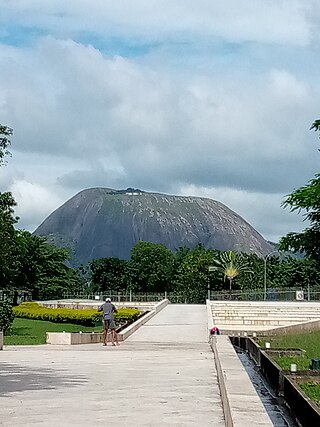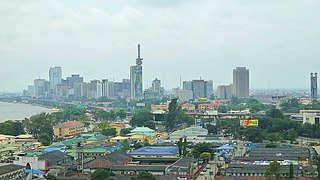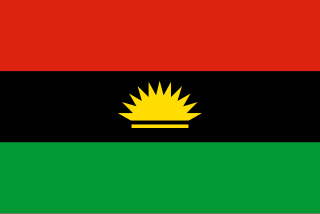Participating nations
 Egypt (7)
Egypt (7) Nigeria (2)
Nigeria (2) South Africa (5)
South Africa (5) Zambia (1)
Zambia (1) Zimbabwe (1)
Zimbabwe (1)
Squash was among the sports at the 8th All Africa Games held in October 2003 in Abuja, Nigeria. Play featured both a men's and women's singles and team tournaments.
| Event | Gold | Silver | Bronze |
|---|---|---|---|
| Men's singles: | Karim Darwish | Mohammed Abbas | Rodney Durbach Adrian Hansen |
| Women's singles: | Omneya Abdel Kawy | Engy Kheirallah | Eman el Amir Amnah el Trabolsy |
| Men's team: | |||
| Women's team: |

Nigeria, officially the Federal Republic of Nigeria, is a country in West Africa. It is situated between the Sahel to the north and the Gulf of Guinea to the south in the Atlantic Ocean. It covers an area of 923,769 square kilometres (356,669 sq mi). With a population of more than 230 million, it is the most populous country in Africa, and the world's sixth-most populous country. Nigeria borders Niger in the north, Chad in the northeast, Cameroon in the east, and Benin in the west. Nigeria is a federal republic comprising 36 states and the Federal Capital Territory, where its capital, Abuja, is located. The largest city in Nigeria is Lagos, one of the largest metropolitan areas in the world and the largest in Africa.

The history of Nigeria can be traced to the earliest inhabitants whose date remains at least 13,000 BC through the early civilizations such as the Nok culture which began around 1500 BC. Numerous ancient African civilizations settled in the region that is known today as Nigeria, such as the Kingdom of Nri, the Benin Kingdom, and the Oyo Empire. Islam reached Nigeria through the Bornu Empire between and Hausa Kingdom during the 11th century, while Christianity came to Nigeria in the 15th century through Augustinian and Capuchin monks from Portugal to the Kingdom of Warri. The Songhai Empire also occupied part of the region. Through contact with Europeans, early harbour towns such as Calabar, Badagry and Bonny emerged along the coast after 1480, which did business in the transatlantic slave trade, among other things. Conflicts in the hinterland, such as the civil war in the Oyo Empire, meant that new enslaved people were constantly being "supplied".

The economy of Nigeria is a middle-income, mixed economy and emerging market with expanding manufacturing, financial, service, communications, technology, and entertainment sectors. It is ranked as the 53rd-largest economy in the world in terms of nominal GDP, the fourth largest in Africa and the 27th-largest in terms of purchasing power parity.

Akinwande Oluwole Babatunde "Wole" Soyinka is a Nigerian playwright, novelist, poet, and essayist in the English language. He was awarded the 1986 Nobel Prize in Literature for his "wide cultural perspective and... poetic overtones fashioning the drama of existence", the first sub-Saharan African to win the Prize in literature.

Biafra, officially the Republic of Biafra, was a partially recognised state in West Africa that declared independence from Nigeria and existed from 1967 until 1970. Its territory consisted of the former Eastern Region of Nigeria, predominantly inhabited by the Igbo ethnic group. Biafra was established on 30 May 1967 by Igbo military officer and Eastern Region governor Chukwuemeka Odumegwu Ojukwu under his presidency, following a series of ethnic tensions and military coups after Nigerian independence in 1960 that culminated in the 1966 anti-Igbo pogrom. The Nigerian military proceeded in an attempt to reclaim the territory of Biafra, resulting in the start of the Nigerian Civil War. Biafra was officially recognised by Gabon, Haiti, Ivory Coast, Tanzania, and Zambia while receiving de facto recognition and covert military support from France, Portugal, Israel, South Africa and Rhodesia. After nearly three years of war, during which around two million Biafran civilians died, president Ojukwu fled into exile in Ivory Coast as the Nigerian military approached the capital of Biafra. Philip Effiong became the second president of Biafra, and he oversaw the surrender of Biafran forces to Nigeria.

Lagos, or Lagos City, is a large metropolitan city in southwestern Nigeria. With an upper population estimate of 21 million, it is the largest city in Nigeria, and the most populous urban area on the African continent. Lagos was the national capital of Nigeria until the government's December 1991 decision to move their capital to Abuja in the centre of the country. Lagos is a major African financial centre and is the economic hub of Lagos State and Nigeria at large. The city has a significant influence on commerce, entertainment, technology, education, politics, tourism, art, and fashion in Africa. Lagos is also among the top ten of the world's fastest-growing cities and urban areas. In 2024, Time Out magazine ranked Lagos as the 19th Best City to visit in the World. A megacity, it has the fourth-highest GDP in Africa, and houses one of the largest and busiest seaports on the continent. Due to the large urban population and port traffic volumes, Lagos is classified as a Medium-Port Megacity.

Nigeria is a federation of 36 states, each of which is a semi-autonomous political unit that shares powers with the federal government as enumerated under the Constitution of the Federal Republic of Nigeria. In addition to the states, there is the Federal Capital Territory (FCT), in which the capital city of Abuja is located. The FCT is not a state, but a territory of the federal government, governed by an administration headed by a minister. Each state is subdivided into local government areas (LGAs). There are 774 local governments in Nigeria. Under the Nigerian Constitution, the 36 states enjoy substantial autonomy but are not sovereign entities, as ultimate authority lies with the federal government. Amendments to the constitution can be proposed by the National Assembly, but for an amendment to be valid, it must be approved by a two-thirds majority of the 36 state legislatures, as required under Section 9 of the 1999 Constitution of Nigeria.

The Africa Cup of Nations, commonly abbreviated as AFCON and officially known as the TotalEnergies Africa Cup of Nations for sponsorship reasons, is the main biennial international men's association football competition in Africa. It is sanctioned by the Confederation of African Football (CAF) and was first held in 1957. Since 1968, it has been held every two years, switching to odd-numbered years in 2013.

Chinua Achebe was a Nigerian novelist, poet, and critic who is regarded as a central figure of modern African literature. His first novel and magnum opus, Things Fall Apart (1958), occupies a pivotal place in African literature and remains the most widely studied, translated, and read African novel. Along with Things Fall Apart, his No Longer at Ease (1960) and Arrow of God (1964) complete the "African Trilogy". Later novels include A Man of the People (1966) and Anthills of the Savannah (1987). In the West, Achebe is often referred to as the "father of African literature", although he vigorously rejected the characterization.

The Igbo people are an ethnic group in Nigeria. They are primarily found in Abia, Anambra, Ebonyi, Enugu, and Imo States. Ethnic Igbo populations are found in Cameroon, Gabon, and Equatorial Guinea, as migrants as well as outside Africa. There has been much speculation about the origins of the Igbo people, which are largely unknown. The Igbo people are one of the largest ethnic groups in Africa.

The Nigerian Civil War, also known as the Biafran War, was a civil war fought between Nigeria and the Republic of Biafra, a secessionist state which had declared its independence from Nigeria in 1967. Nigeria was led by General Yakubu Gowon, and Biafra by Lieutenant Colonel Chukwuemeka "Emeka" Odumegwu Ojukwu. The conflict resulted from political, ethnic, cultural and religious tensions which preceded the United Kingdom's formal decolonisation of Nigeria from 1960 to 1963. Immediate causes of the war in 1966 included a military coup, a counter-coup, and anti-Igbo pogroms in the Northern Region. The pogroms and the exodus of surviving Igbos from the Northern Region to the Igbo homelands in the Eastern Region led the leadership of the Eastern Region to conclude that the Nigerian federal government would not protect them and that they must protect themselves in an independent Biafra.

The Nigeria national football team represents Nigeria in Men's international football. Governed by the Nigeria Football Federation (NFF), they are three-time Africa Cup of Nations (AFCON) winners, with their most recent title in 2013. In February 2024, the Nigerian national football team was ranked 28th in the FIFA rankings. The team has qualified for six of the last eight FIFA World Cups, missing only the 2006 and 2022 editions. They have reached the round of 16 on three occasions. Their first World Cup appearance was in the 1994 edition. The team is a member of FIFA and Confederation of African Football (CAF).

Southern Nigeria was a British protectorate in the coastal areas of modern-day Nigeria formed in 1900 from the union of the Niger Coast Protectorate with territories chartered by the Royal Niger Company below Lokoja on the Niger River.
Nigerian Pidgin, also known simply as Pidgin or Broken or as Naijá in scholarship, is an English-based creole language spoken as a lingua franca across Nigeria. The language is sometimes referred to as Pijin or Vernacular. First used by British colonists and slave traders to facilitate the Atlantic slave trade in the late 17th century, in the 2010s, a common orthography was developed for Pidgin which has been gaining significant popularity in giving the language a harmonized writing system.

MTN Group Limited is a South African multinational corporation and mobile telecommunications provider. Its head office is in Johannesburg. MTN is among the largest mobile network operators in the world, and the largest in Africa.

There are over 700 native languages spoken in Nigeria. The official language is English, which was the language of Colonial Nigeria. The English-based creole Nigerian Pidgin – first used by British and African slavers to facilitate the Atlantic slave trade in the late 17th century – is the most widely spoken lingua franca and spoken by over 60 million people.

Boko Haram, officially known as Jamā'at Ahl as-Sunnah lid-Da'wah wa'l-Jihād, is an Islamist jihadist organization based in northeastern Nigeria, which is also active in Chad, Niger, northern Cameroon, and Mali. In 2016, the group split, resulting in the emergence of a hostile faction known as the Islamic State's West Africa Province.

The Boko Haram insurgency began in July 2009, when the militant Islamist and jihadist rebel group Boko Haram started an armed rebellion against the government of Nigeria. The conflict is taking place within the context of long-standing issues of religious violence between Nigeria's Muslim and Christian communities, and the insurgents' ultimate aim is to establish an Islamic state in the region.

David Adedeji AdelekeOON, known professionally as Davido, is a Nigerian-American singer, songwriter and record producer. Born in Atlanta, Georgia, and raised in Lagos, Nigeria, Davido commenced his music career as a member of KB International. He garnered widespread recognition following the release of "Dami Duro", the second single from his debut studio album Omo Baba Olowo (2012). The album subsequently spawned six additional singles: "Back When", "Ekuro", "Overseas", "All of You", "Gbon Gbon", and "Feel Alright".